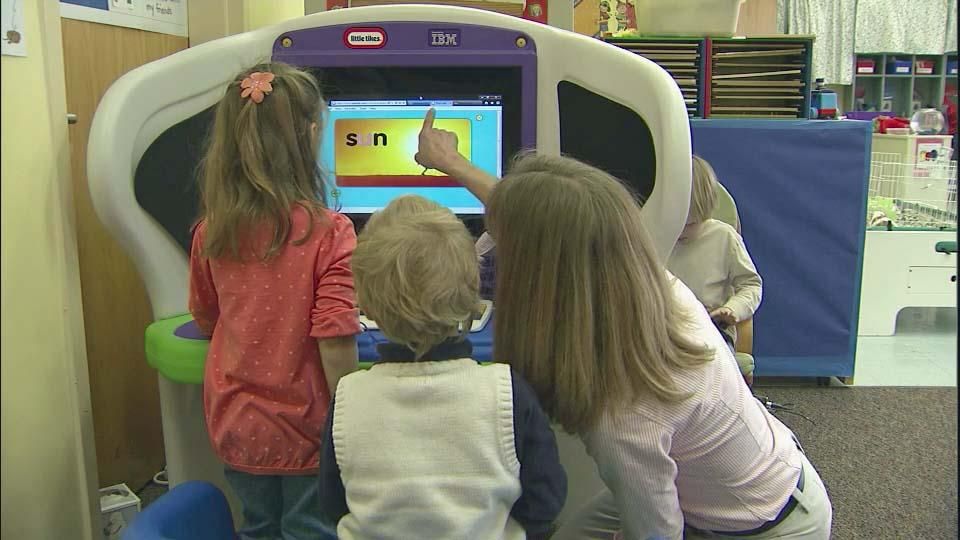JUSTIN PARMENTER: N.C virtual pre-K pilot driven by stereotypes, not data

EDITOR’S NOTE: Justin Parmenter is a seventh grade language arts teacher at Waddell Language Academy in the Charlotte-Mecklenburg County school system.
North Carolina state Rep. Craig Horn is promising to “redouble” his efforts to bring virtual Pre-K to impoverished four year olds, despite the fact that the pilot program was not included in the Senate budget passed last week.
The program would provide in-home access to online preschool for North Carolina children who are living below the federal poverty line.
Horn emphasized that virtual Pre-K is “not a replacement for, or an alternative to, face-to-face, high quality pre-K” in a recent interview with N.C. Policy Watch. Still, he has yet to publicly explain why the legislation includes the following language: “(ii) test the feasibility of scaling a home-based curriculum in reading, math, and science delivered by computers and the Internet to all preschool-age children in the State.”
In an impassioned speech to the House K-12 Education Committee in April, the Union County legislator identified the target demographic for his proposed online preschool program:
“We are targeting our most underserved children, four year olds that for whatever reason don't have access to a Pre-K or just can't get to one. Transportation issues, health issues, socio-economic issues, issues that we can't even imagine. ... I’m not willing to leave these kids that are not on that list for any reason, I’m not willing to leave them behind."
“Socio-economic issues”? What does that even mean?
It should not be too much to expect that our lawmakers take a thoughtful, measured approach to public policy. Responsible governance on solving Pre-K access problems would involve collecting data on which families are not taking advantage high quality Pre-K, identifying barriers to access, and working in good faith to address those barriers well before turning to an electronic screen to teach four year olds.
In this case exactly none of that due diligence has been done. In fact, no data currently exists on the reasons families have for turning down an NC Pre-K slot. The whole idea behind this bill is built on Horn’s stereotypes of poor families and their “socio-economic issues.”
Horn has also repeatedly claimed that he is fully committed to expanding legitimate Pre-K, telling the K-12 Education Committee he believes: “We may, and I think we will, continue to expand access for Pre-K.” However the National Institute for Early Education Research recently called on state lawmakers to do a better job of providing young children with the foundation they need to be successful in school. They seem to think Horn and his colleagues are leaving far too many of them behind:
N.C. Pre-K now reaches less than half (47 percent) the children it was designed to serve. Significant numbers of young children – almost 33,000 across all races and ethnicities, in both rural and urban areas -- are losing the opportunity to develop foundational skills needed to succeed in school and beyond. In fact, 40 counties are serving less than half of eligible children.
While children may be attending other early education programs, those programs do not provide all the quality components of N.C. Pre-K—so those vulnerable children are less likely to gain the lasting benefits provided by N.C. Pre-K.
This year’s House budget calls for no additional funding for N.C. Pre-K beyond what was already passed into law during previous sessions.
The estimated cost of providing real Pre-K to all four year olds in North Carolina stands at just over $300 million. It would be a lot more likely we could move toward universal access if Horn and his fellow legislators hadn’t voted to cut income taxes to benefit large corporations and wealthy individuals, the most recent round of cuts depriving our state of $900 million in annual revenue.
All of our children deserve access to a Pre-K program where they can work with qualified human teachers and peers to develop communication and collaboration skills that will make for a smooth transition to kindergarten. Our budget priorities should reflect our belief that they deserve it. And if there are indeed families who are not able to take advantage of those opportunities, our legislators should care enough to identify and help them overcome the obstacles they face.
As Winston Churchill put it, "It is no use saying: ‘We are doing our best.’ You have got to succeed in doing what is necessary."









